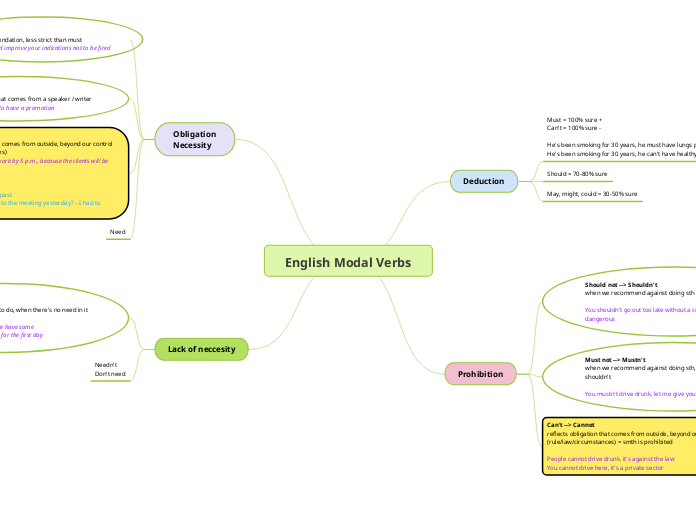English Modal Verbs
Deduction
Must = 100% sure +
Can't = 100% sure -
He's been smoking for 30 years, he must have lungs problems
He's been smoking for 30 years, he can't have healthy lungs
Should = 70-80% sure
May, might, could = 30-50% sure
Prohibition
Should not --> Shouldn't
when we recommend against doing sth
You shouldn't go out too late without a company, it might be dangerous
Must not --> Mustn't
when we recommend against doing sth, but stricter than shouldn't
You mustn't drive drunk, let me give you a lift home
Can't --> Cannot
reflects obligation that comes from outside, beyond our control (rule/law/circumstances) = smth is prohibited
People cannot drive drunk, it's against the law
You cannot drive here, it's a private sector
Obligation
Necessity
Should
Recommendation, less strict than must
You should improve your indications not to be fired
(+) S + should + V
(-) S + should + not + V
(?) Q.w. + should + V ?
Must
reflects obligation that comes from a speaker / writer
You must work hard to have a promotion
(+) S + must + V
(-) S + must + not + V
(?) Q.w. + must + V ?
Have to
reflects obligation that comes from outside, beyond our control (rule/law/circumstances)
You have to finish this work by 5 p.m., because the clients will be waiting for it.
+
to replace must in the past
– Why didn't you come to the meeting yesterday? – I had to help my mom.
(+) S + have(has)(had)(will have) to + V
(-) S + don't/doesn't have to + V
(?) Q.w. + do / does + S + have to + V
Need
Lack of neccesity
Don't have to
when smth is not necessary to do, when there's no need in it
You don't have to buy wine, we have some
You don't have to buy flowers for the first day
(-) S + don't/doesn't have to + V
Needn't
Don't need
